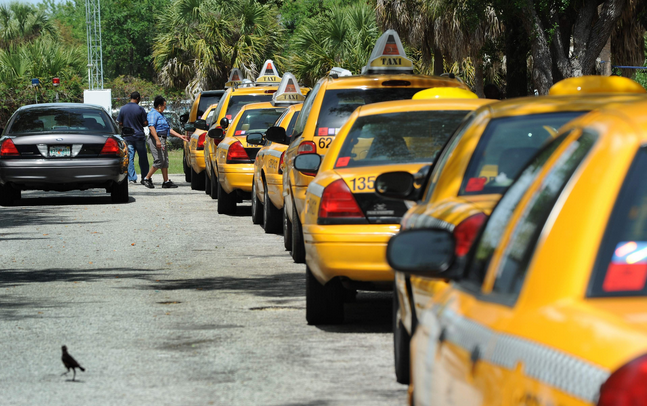It’s fraud. Or ext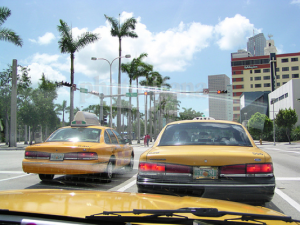 ortion. Or both.
ortion. Or both.
Miami-Dade County sold six taxi medallions at auction for about $2.4 million dollars in 2012, an average of $400,000 each.
This is on top of the 20 medallions awarded to taxi drivers through a lottery every year from 1999 to 2011– at $20,000 a pop.
Folks paid those prices because they thought they were getting something special. It was like admission into an exclusive club.
Sure, the closed club (think Mafia) was started by taxi owners who wanted to have a monopoly on the business. But Miami-Dade, the government, certainly found a way to cash in. Like Cousin Vinnie.
Then along come black car services like Lyft and Uber and the “for hire transportation” club is flooded with a bunch of new driver members who never paid any dues and 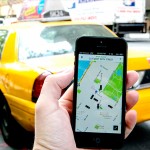 operate without a single medallion.
operate without a single medallion.
How much are those medallions worth now, as the county allows Uber and Lyft to operate illegally? How much will they be worth if these services are legalized without the regulations and limitations that taxi and limousine drivers have to deal with?
Nothing. Zero. Nada. Zip.
So, the county may have to give these people their money back. They should anyway. Because the county is the one that made them worthless. Mayor Carlos Gimenez may have to dig into his good news 2015-16 budget for a $2.4 million refund. Because it seems to me that an attorney could make a property rights case out of this.
It’s also something that Commissioner Esteban Bovo ought to be thinking about the county’s liability as he reconsiders his “Santa Clause” 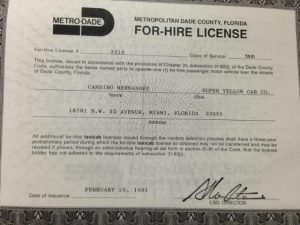 ordinance to legalize Uber and Lyft without equal regulation and protection for us, the passengers.
ordinance to legalize Uber and Lyft without equal regulation and protection for us, the passengers.
But medallions are not the only way the county gets funding from the taxi cab and limousine industry.
Owners must pay a $625 annual operating fee for each cab. The total of that last year was $1,326,000, according to Raul Gonzalez , the county’s “For-Hire Passenger Transportation” coordinator in the Business Affairs division of the Regulatory and Economic Resources Department.
Read related story: Double standard: Miami-Dade lets Lyft, Uber run over the rules
Cabs must be inspected every year if they’re new, every three months if they’re older, at a county vehicle inspection site, to make sure the brakes work, tires aren’t bald and are aligned, the lights work and the air conditioning blows cool air. That amounted to $378,000 last year, he said.
Drivers must also pay $55 a year for a county license. There are about 5,000 drivers, Gonzalez said. That means $275,000.
But the big money is at the airport, where cabs are charged $2 per fare and limos pay $5 per fare. 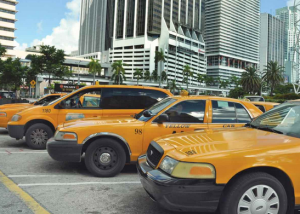 This resulted in more than $3 million in collections last year, Gonzalez said.
This resulted in more than $3 million in collections last year, Gonzalez said.
It adds up to about $5 million a year, give or take a few hundred thousand. These funds go to the county’s regulatory and economic resources department, almost entirely run by proprietary funds, which then enforces regulations that guide these “for hire transportation” vehicles. It pays for enforcement officers to write Uber and Lyft more than 2,480 citations in the last year for operating illegally.
About 90 percent of those are being appealed, Gonzalez said. They can”t pay those costs. Because then they would go out of business here — like they did in Broward.
Speaking of costs, why does the county dictate what the taxi drivers charge? Shouldn’t the free market dictate that?
One of the biggest advantages that Lyft and Uber have on the taxis is they are cheaper. But cabbies can’t just set their own rates. The county actually mandates that they charge $2.50 for the first mile, then $2.40 per mile after, registered on their meter, which is checked by the county to ensure that the mileage and the meter match up. Uber drivers can charge as little as 90 cents a mile, but the prices sp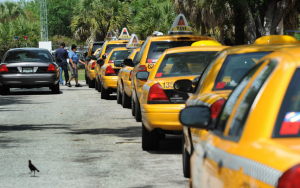 ike when the demand is greater than the supply.
ike when the demand is greater than the supply.
“Uber drivers charge five times as much during peak times, like the Super Bowl or Heat games,” said Rudy Gonzalez (no relation to Raul), whose been in the business 40 years and owns Super Yellow Taxi. “We can’t compete on an even playing field because we can’t do that. The county dictates what we charge.”
There are flat rates for several routes from the airport. To the seaport, $24. To South Beach, it’s $35. Key Biscayne will cost you $41. These are cash discount prices. There is a $3 fee for credit card charges.
Taxi drivers, want as they may, cannot offer a break. Unless they turn the meter off, and that’s against the regulations.
The more Ladra looks into this feud between the taxi industry and the up-and-coming black cars services like Uber and Lyft, the more the county looks like the mafia.
If the county were to let the taxis operate more freely, like Lyft and Uber are operating now, Ladra is certain we would see their prices drop. And that would be good for everybody.
Well, maybe not for Uber and Lyft. Because let’s face it. Their business model depends on taxis being more expensive.

